Quicksilver Blu-ray Movie
HomeQuicksilver Blu-ray Movie 
Image Entertainment | 1986 | 106 min | Rated PG | Aug 06, 2013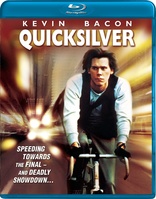
Movie rating
6 | / 10 |
Blu-ray rating
| Users | 2.8 | |
| Reviewer | 2.5 | |
| Overall | 2.6 |
Overview
Quicksilver (1986)
A former options trader takes a job as a bike messenger after incurring major losses in the market.
Starring: Kevin Bacon, Jami Gertz, Paul Rodriguez, Laurence Fishburne, Louie AndersonDirector: Thomas Michael Donnelly
| Thriller | Uncertain |
| Crime | Uncertain |
| Drama | Uncertain |
Specifications
Video
Video codec: MPEG-4 AVC
Video resolution: 1080p
Aspect ratio: 1.85:1
Original aspect ratio: 1.85:1
Audio
English: DTS-HD Master Audio 2.0 (48kHz, 24-bit)
Subtitles
English SDH
Discs
25GB Blu-ray Disc
Single disc (1 BD)
Playback
Region A (B, C untested)
Review
Rating summary
| Movie | 1.5 | |
| Video | 4.0 | |
| Audio | 3.5 | |
| Extras | 0.0 | |
| Overall | 2.5 |
Quicksilver Blu-ray Movie Review
Neither Quick Nor Shiny
Reviewed by Michael Reuben August 3, 2013Kevin Bacon has said that his career stalled between his breakout starring role in the hit Footloose (1984) and his small but memorable appearance as a gay right-wing hustler in Oliver Stone's JFK (1992), which redefined him as a character actor. Although Bacon worked steadily during those eight years, most of the movies weren't successful, and those that were left the actor feeling that he had taken a wrong turn. A particular disappointment was the commercial failure of She's Having a Baby (1988), the comedy about marriage and commitment that Bacon made with John Hughes, which is overdue for a rediscovery. Quicksilver, the first feature Bacon completed after Footloose, falls into this fallow period, and Bacon has never had anything good to say about it. The new Blu-ray released by Image/RLJ Entertainment under its licensing deal with Sony will do nothing to improve the 1986 film's reputation. Written and directed by Thomas Michael Donnelly, whose subsequent sketchy career has been almost entirely in TV movies, the film feels like a project quickly assembled to cash in on Bacon's fleeting status as a teen heartthrob after the success of Footloose, its soundtrack and its music videos. Quicksilver bombed on release, and it hasn't aged well.
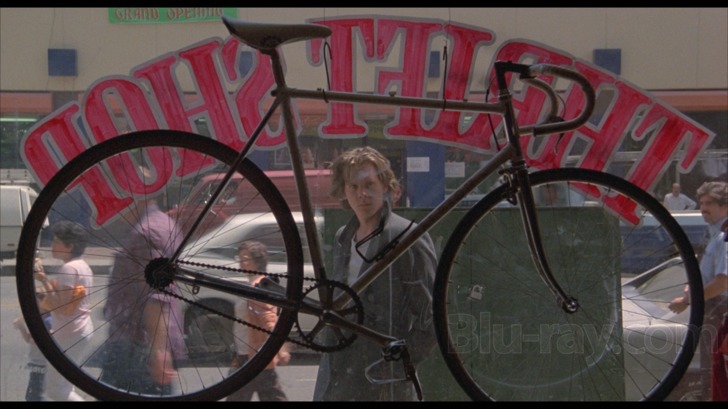
Looking at the cover art and advertising copy, one would be pardoned for assuming that Quicksilver is an earlier version of the recent Premium Rush, whose plot focused on bicycle messengers. But Quicksilver bears little resemblance to David Koepp's efficient little thriller. A bicycle messenger service (called "Kurtzweill's Quicksilver Express") does play a part, but it isn't central to the film. Deciphering what is central poses a challenge, because Quicksilver is one of those Frankenstein monsters assembled out of lifeless parts robbed from the graves of other movies: dance sequences from Footloose, the hero's fall and redemption from every feel-good movie ever made, an urban crime-doesn't-pay story and a romance about an abandoned waif who has to learn to trust again. (There are probably a few more that I missed.) Unfortunately for the audience, writer-director Donnelly never finds the electric spark to shock this lumbering assemblage into a semblance of life. Start with the location. The main character, Jack Casey (Bacon), is a hotshot options trader, and one sequence involves a bike race that unmistakably occurs on the steep slopes of the streets of San Francisco. (No other city in America looks quite like that.) This, plus the plethora of California license plates, has led some viewers to conclude that Jack trades options on the Pacific Stock Exchange (which is now defunct). But Jack's accent and those of numerous characters have a New York flavor, and the sight of bicycle messengers weaving in and out of traffic is a distinctly Manhattan phenomenon. The employees of Quicksilver Express are an ethnic mix that screams NYC; most of the film was shot in Los Angeles, which often doubles for New York; and the dispatcher calls out delivery destinations that sound like New York addresses. So where does Quicksilver takes place? Beats me. As the film opens, Jack has an extremely bad day after taking some aggressive positions in the market. He gets wiped out, losing his money, his parents' life savings and apparently a lot of client funds. (Jack's affiliation with a firm, if any, is one of many elements left vague.) Broke and with his confidence shot, Jack quits trading and reconnects with his true self. We know it's his true self, because he loses the creepy Hitler moustache and salesman's haircut he sported as a trader and recovers the flowing locks that everyone loved in Footloose. Then he buys a secondhand bike and takes a job at Quicksilver Express, where he becomes friends with Hector (Paul Rodriguez). Other bicycle messengers at Quicksilver include Voodoo (Laurence Fishburne, still going by "Larry" in his pre-Morpheus days), Tiny (Louie Anderson) and the new girl, Terri (Jami Gertz). One part of Quicksilver is Jack's redemption, but it's a sign of the film's muddy vision that, even after he redeems himself by the end, Jack's life remains in suspense. His former partner, Gabe (Andrew Smith, primarily a writer for SNL, Politically Incorrect and The View), keeps telling him to come back to the trading floor, because Jack has "the touch" (whatever that means). But Quicksilver holds the world of finance at arms-length, treating it with suspicion as if Jack's former career is no different than gambling at a rigged table (which, given the events of subsequent decades, may not be far from the truth). Besides, Jack enjoys the physical thrill of speeding through the city, the freedom from anxiety, the easygoing independence of a simpler life. If only he could recover all that money he lost his parents—which, of course, he does by the end of the film, when he ventures back onto the floor for One Last Score to help his buddy Hector buy a hotdog stand. (No, really!) But will he remain on that secondhand bike forever? Maybe they hoped for a sequel, Quicksilver 2: The Public Offering. Another part of Quicksilver is the threat from a small-time gangster known as Gypsy (Rudy Ramos), who uses Quicksilver messengers as couriers, presumably for drugs. (He also deals in illegal guns, but that's just filler.) Initially Gypsy has Voodoo running his errands, but later he latches onto Terri, presumably because he finds her attractive. Gypsy has a slight stutter, and he doesn't reach the first rank (or the second, or even the third) of intimidating movie villains, but he makes the appropriate noises and uses his car as a weapon. Eventually, all the Quicksilver messengers unite to take him down, with Jack riding to Terri's defense. A third part of Quicksilver is Terri's story, which is woefully underwritten and can't be salvaged even by Jami Gertz's winning presence. Saddled with an undefinable Brooklyn/Queens/Jersey accent with which she is obviously uncomfortable, Gertz does her best to make something out of a character whose only quality is that she tells extreme fibs about her background and gets tangled in her own lies. There's a hint of future romance between Terri and Jack, but it can't go anywhere during the film because of Jack's girlfriend. Girlfriend? That's a fourth part of Quicksilver. Jack carries his messenger's bike into his enormous warehouse apartment with the crumbling walls and finds Rand (Whitney Kershaw) hard at work on her ballet exercises. Yes, ballet exercises. Is she a professional dancer? A spoiled rich girl? Someone new in his life? A holdover from his previous life? The screenplay can't be bothered with such trivia, because Rand's primary purpose is to be the girl in a choreographed interlude involving Jack and his bicycle that is obviously meant to be lifted from the film and dropped directly into a music video. (Quicksilver has several such sequences.) Rand's only other purpose is to get jealous of Terri and mock Jack for lacking ambition. Then she's gone. If Quicksilver were really about bicycle messengers, you might actually see some pickups and deliveries, but you don't. The major biking sequences involve either races (between Jack and Voodoo or between Jack in a taxi and a nameless bike messenger) or Gypsy in his car pursuing Jack with deadly intent. In many ways, these are the best parts of the film, because at least you know why people are doing what they're doing.
Quicksilver Blu-ray Movie, Video Quality 

Quicksilver was shot by Thomas Del Ruth, who gave the film some of the urban grit he would bring a few years later to The Running Man. (Del Ruth could also do clean and glossy, as he'd shown on The Breakfast Club and would display throughout multiple seasons of The West Wing.) Sony has done their usual creditable job on their catalog titles released through Image, and Del Ruth's imagery has been rendered intact, which means that some viewers will complain about a handful of "grainy" shots, mostly interiors and night scenes. The bulk of the film is relatively smooth, though it has the film-like texture that anyone who attended cinemas in this era will remember and appreciate. Preserved with the grain is substantial detail, enough to make out all the California license plates in a cityscape that is attempting to stand in for New York (or, alternatively, the L.A.-like streets and back alleys in a town attempting to stand in for San Francisco; take your pick). Blacks are generally solid, and contrast does not blow out shadow detail except by design (a notable example is a shot of Bacon and Fishburne silhouetted against a gray morning sky). Colors are varied and range from muted to vibrant, depending on the locale. It's certainly no accident that the down 'n' out environs where the bike messengers congregate are more colorful than the chillier toned trading floors where the brokers scream their orders. With no extras, there's plenty of room on a BD-25 for the 107-minute film. The average bitrate of 25.34 Mbps is enough to accommodate the various scenes of bikes and car traffic whizzing by, which were impossible to capture adequately in screenshots, due to motion blur.
Quicksilver Blu-ray Movie, Audio Quality 
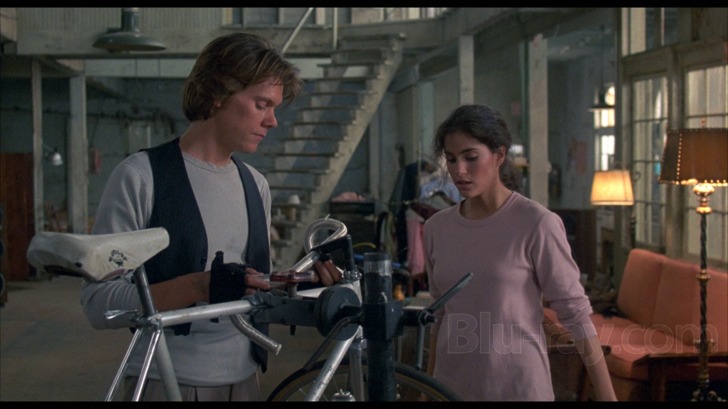
Quicksilver's original stereo soundtrack is presented in lossless DTS-HD MA 2.0, and you can tell almost from the opening that it was intended to sell records. It has the pop, sizzle and boom of music designed for radio play, and in fact the theme song, "Quicksilver Lightning", written by Giorgio Moroder and Dean Pitchford and sung by The Who's Roger Daltrey, was a minor hit (certainly more so than the movie). Additional songs feature vocals by such familiar Eighties figures as Peter Frampton, John Parr and Ray Parker Jr., while the musical underscore was provided by Tony Banks of Genesis. The music gets the benefit of good stereo separation, and it doesn't interfere with either the dialogue or basic sound effects, which do their job but are nothing special.
Quicksilver Blu-ray Movie, Special Features and Extras 
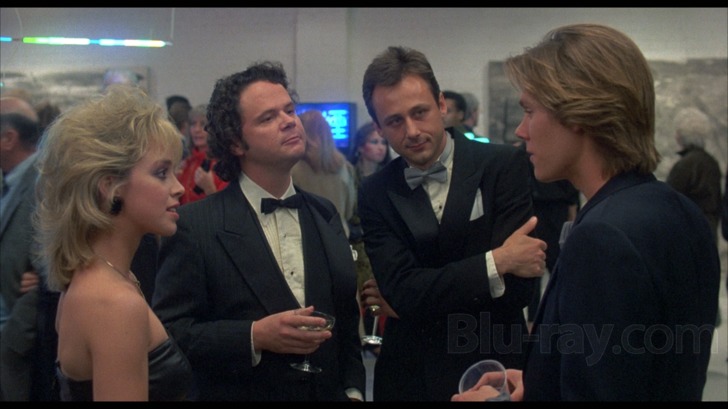
The disc contains no extras. Sony's 2002 DVD contained trailers, although I do not know which ones.
Quicksilver Blu-ray Movie, Overall Score and Recommendation 
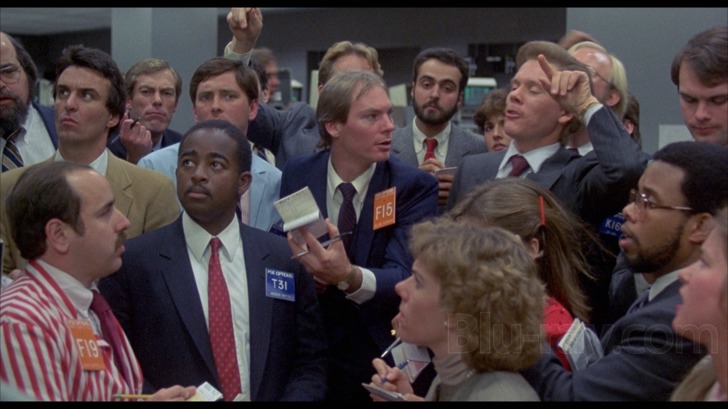
I hadn't seen Quicksilver since it first appeared, and as I sat down to watch it for this review, I kept wondering why I couldn't remember anything about its plot. A hundred and seven soporific minutes later, I had my answer. The film is such a disjointed, unfocused mess that not even its otherwise appealing leads can keep it interesting. Some films deserve to be forgotten. Quicksilver is one of them. Every film has its fans, and if this one has a special place in your heart, the Blu-ray will not disappoint. Others should look elsewhere.
Similar titles
Similar titles you might also like

Kid Cannabis
2014

The Principal
1987

The Fan
Retro VHS Collection
1996

Black and Blue
2019

Find Me Guilty
2006

Reservation Road
2007

Bad Boys
1983

The Gateway
2021

Boulevard Nights
Warner Archive Collection
1979

Eddie Macon's Run
1983

Changing Lanes 4K
2002

Body Count
1998

Tulsa King: Season Two
2024

Infinite Storm
2022

Ricochet
1991

True Believer
Retro VHS Collection
1989

Paparazzi
2004

Ransom
15th Anniversary Edition
1996

Empire
2002

Midnight in the Switchgrass
2021